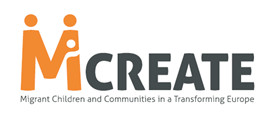Migrant Children and Communities in a Transforming Europe (MICREATE)
 Many children are actively and positively engaged in creating their lives and future for themselves – probably more than we are willing to admit – but they soon become bounded by what adults think is their best interests. In this regard, the project highlights that the existing social and political order does not offer enough autonomous space where children could independently speak for themselves. Our aim in this regard is to create ‘a space’ where migrant children of all ages are able to communicate and share their experiences after arriving in receiving societies. The proposed project embarks on a mission to gather their stories in order to support their needs and aspirations when it comes to integration into host societies, with an aim to make heard the voices of the least powerful members of communities, as an argument and factor for change. Our basic standpoint is that child-centered integration policies, integration programmes, practices and initiatives are among most important factors to support migrant children to become partners and participants in the development of a cohesive societies, with equal opportunities and secured rights as individuals, but also as members of minority and migrant groups in different spheres (education, labour market, housing, civil society, etc.).
Many children are actively and positively engaged in creating their lives and future for themselves – probably more than we are willing to admit – but they soon become bounded by what adults think is their best interests. In this regard, the project highlights that the existing social and political order does not offer enough autonomous space where children could independently speak for themselves. Our aim in this regard is to create ‘a space’ where migrant children of all ages are able to communicate and share their experiences after arriving in receiving societies. The proposed project embarks on a mission to gather their stories in order to support their needs and aspirations when it comes to integration into host societies, with an aim to make heard the voices of the least powerful members of communities, as an argument and factor for change. Our basic standpoint is that child-centered integration policies, integration programmes, practices and initiatives are among most important factors to support migrant children to become partners and participants in the development of a cohesive societies, with equal opportunities and secured rights as individuals, but also as members of minority and migrant groups in different spheres (education, labour market, housing, civil society, etc.).
The overall objective of the project is to stimulate inclusion of diverse groups of migrant children by adopting child-centered approach to migrant children integration on educational and policy level. Stemming from the need to revisit the existing integration policies, the research project aims at comprehensive examination of contemporary integration processes of migrant children in order empower them. The project is problem-driven and exploratory at the same time. Its exploratory part mainly concerns child-centered approach to understanding integration challenges, migrant needs and their well-being. However, the findings of the open-ended exploratory research will be used in an explicitly problem-driven way – with an aim to stimulate migrant inclusion, to empower migrants and build their skills already within the (participatory) research.
The research activities on educational staff and school systems as well as newly arrived migrants, long-term residents and local children will be conducted in schools in Slovenia, Denmark, Spain, United Kingdom, Austria and Poland. Along with fieldwork with children in schools, fieldwork with children in transition will take place in camps and institutions in Palermo (Italy), Calais (France), Moria (Greece), Şanlıurfa (Turkey), Linin Reception Camp (Poland), asylum homes in Slovenia and Austria. More than 550 migrant children will take part in the research activities of the MiCreate project. The conclusions of crosscutting analysis and findings from the fieldwork with teachers, local and migrant children will provide a base for policy recommendations and development of integration tools through the activities of Integration Lab.
More: www.micreate.eu
Results
- Vlasta Jalušič and Veronika Bajt.2020. A paradigm shift framed by a crisis: recent debates on immigration and integration in six EU countries in Annales, Anali za istrske in mediteranske študije, Series Historia et Sociologia, 30, 4.
Partners:
Funders:
 The project is cofinanced by the European Union’s Horizon 2020 research and innovation programme.
The project is cofinanced by the European Union’s Horizon 2020 research and innovation programme.